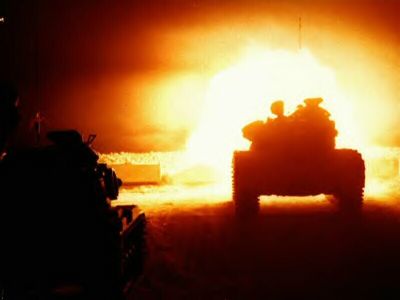Sunday, July 24, 2005
Doug Giles: Blair needs to channel Churchill
So much for sugar-coating anything This is not PC. But some thong that must be said. If the crazies can't play nicely with others, then burn their house down and scatter the ash to the 4 winds.
Sunday, July 10, 2005
LAw of War
CONDUCT COMBAT OPERATIONS ACCORDIG TO THE LAW OF WAR
181-906-1505
CONDITIONS
Given a combat situation and you are faced with the following.
- Enemy troops, equipment, material, and supplies.
- Inhabited towns and cities.
- Protected property (hospitals, museums, schools, churches, etc).
- Civilians and private property
- Sick and wounded captives and detainees.
- Surrendering enemy troops.
- Observing a member of your force about to perform an illegal action.
- Receiving an order to perform an illegal action
- Being captured by the enemy and being held as a prisoner of war (PW)
STANDARDS
- Perform combat operations using lawful weapons and tactics, and engaging only lawful targets.
- Treat all captives, civilians, and their property according to the law of war.
- Take appropriate action when faced with violations of the law of war or illeagal orders.
- Identify your rights and duties as a PW.
TRAINING AND EVALUATION
Training Information Outline
- Perform your combat mission using lawful weapons and tactics, and attack only lawful targets
- All United States/North Atlantic Treaty Organization (US/NATO) issued weapons and ammunition are lawful. Do not alter your weapons or ammunition to increase enemy suffering (for example, dumdum bullets, poisoned ammunition and altered bayonets).
- Unlawful tactics include faking surrender, using enemy marked vehicles and uniforms DURING combat, and booby trapping dead or wounding personnel. Also, medical service symbols (Red Cross, Red Crescent, the Red Lion and Sun, and the Red Star of David) can not be used except for medical act ivies.
- Attack only combat targets. Use the firepower necessary to accomplish your mission but avoid needless destruction.
(1) Civilians and soldiers who have surrendered, or who are captured, sick or wounded are not combat targets. Medical personnel, vehicles and facilities are also not combat targets.
(2) Undefended civilian buildings including those used for religious, art, science, or charitable purposes; historic monuments, and hospitals are not combat targets. A red cross or red crescent on a white background, or, in Europe, a blue and white shield often mark protected property.
- Treat captives, civilians, and property on the battlefield according to the law of war.
- Allow enemy soldiers to surrender. Treat all captives as enemy prisoners of war (EPW).
(1) Protect them from acts of violence, intimidation, and sexual abuse. Provide them food, water, shelter, and medical treatment.
(2) Safeguard captives from the dangers of combat. Captives may not be used as shields or screens, to clear or plant mines and booby traps, or as hostages. Evacuate them as soon as possible.
- Treat all civilians humanely. Treat them as you would want to be treated.
(1) Do not use physical force or mental coercion on civilians. Protect them from acts of violence, intimidation, and sexual abuse.
(2) Collective punishment, reprisals, and the taking of hostages is prohibited.
- Treat property found on the battlefield in the proper manner.
(1) Turn enemy military property such as weapons, maps, vehicles, and items of intelligence value in to the chain of command.
(2) Civilian property and captives’ personal property and military equipment necessary for personal protection and welfare (helmets, protective masks, and clothing) may not be seized, stolen, or looted. In certain limited situations, civilian property may be requisitioned due to military necessity; but this decision must be made by the commanding officer.
- Identify violations of the law of war or illegal orders and try to stop them. Report all violations by friendly or enemy troops.
- Violations of the law of war are criminal acts. They are punishable inder the Uniform Code of Military Justice (UCMJ).
- If you believe the law of war is being violated, do your best to stop it.
(1) Clarify unclear orders by repeating what you believe to be your correct orders.
(2) State that you disagree with the act.
(3) Use moral arguments.
(4) Threaten to report the act.
(5) Ask the senior soldier to stop the act.
(6) Refuse to obey an order to commit a criminal act.
- If the act is done or the criminal order is not withdrawn, immediately report the act or order through your chain of command. If the chain of command is not appropriate (such as when a member of the chain of command is suspected of committing a criminal act), report it to the Inspector General (IG). Provost Marshal, chaplain, or a Judge Advocate General’s Corps (JAG) officer. You must report all war crimes no matter who commits them. Crimes committed by the enemy must also be reported.
- Recognize the correct treatment for PW’s. This applies to both your captives and to you (if you become a PW).
- PW’s have the following rights:
(1) Receive housing and clothing.
(2) Receive enough food to stay in good health.
(3) Receive adequate medical care.
(4) Receive necessary facilities for proper hygiene.
(5) Practice their religious faith of choice.
(6) Send and receive mail.
(7) Keep personal property except weapons and military equipment and documents not needed for personal safety.
(8) Receive packages containing food, clothing, educational, religious, or recreational material.
(9) Be represented be a fellow PW.
(10) Receive humane treatment from their captors.
(11) Have a copy of the Geneva Convention on Prisoners of War and its annexes, including any special agreements posted in a location where they can be read by PW’s. They must be written in the PW’s language.
(12) Have a copy of all camp regulations, notices, orders, and publications about their conduct as a prisoner of war posted where they can be read. They must be written in the PW’s language.
- As a PW you must:
(1) Tell your captors only your name, rank, service number, and date of birth.
(2) Obey all lawful rules established by your captors.
(3) If required by your captors, you must perform labor which is nonmilitary and is not humiliating, dangerous, or unhealthy. Captors can require Noncommissioned Officers (NCOs) only supervise such labor.
EVALUATION PREPERATION
SETUP: Soldiers should be individually tested for this task. The evaluator briefs the soldier of the simulated combat situation. The soldier is then questioned as to his recognition and actions regarding the performance measures. The most realistic training of this task is to include law of war problems in Army Training and Evaluation Programs (ARTEP) and field training exercises (FTX). The problems should require skill level 1 soldier recognition and action.
BRIEF SOLDIER: Tell the soldier that he or she is in a simulated combat environment. The US is at war and the soldier may engage various targets using a variety of weapons and ammunition. Enemy soldiers may surrender, be sick or wounded, or capture the soldier. Civilian buildings, and many types of property may be on the battlefield. The soldier will be asked to describe types of targets, weapons, tactics, personnel, and what actions he or she should take.
REFERENCES:
FM 27-2
FM 27-10
TC 27-10-1
TC 27-10-2
(from STP21-1-SMCT Soldiers Manual of Common Tasks Skill Level 1, 1 October 1990)
Saturday, July 09, 2005
This will help
"They did not bomb London because there is insufficient transparency in Congress about the Gitmo detainees; they bombed London because it is part of the Zionist-Crusader Conspiracy run by the sons of monkeys and pigs, who must submit or die."
From http://www.lileks.com/screedblog/index.html





